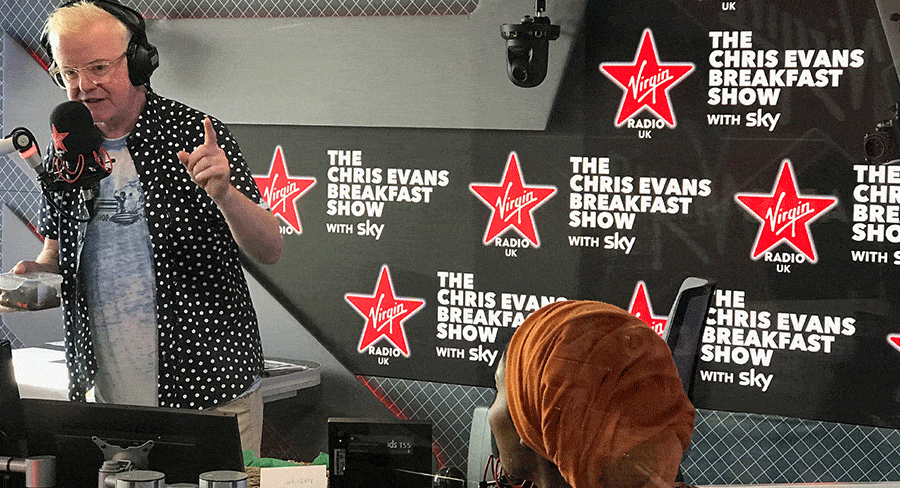By James Manning
Two of the most innovative stations on UK radio couldn’t be more different. One is a massive big budget nationwide play to take Virgin Radio ahead of the pack. The other is a bold recent launch targeting a niche market.
Both stations have two similarities though – they are both DAB+ and they both have Aussies and Brits with Aussie experience in key roles.
This past week Mediaweek was lucky enough to get inside the engine room of both operations.
The big budget play is at News Corp-owned Virgin Radio. Its Wireless Group brands have had success in talk with Talk Sport and Talk Radio, but more recently success has eluded the music station Virgin Radio.
In a bold move last year the station employed British-born radio executive Mike Cass who is best known to Mediaweek readers for his successful time at Nova stations in Perth and Melbourne earlier this decade.
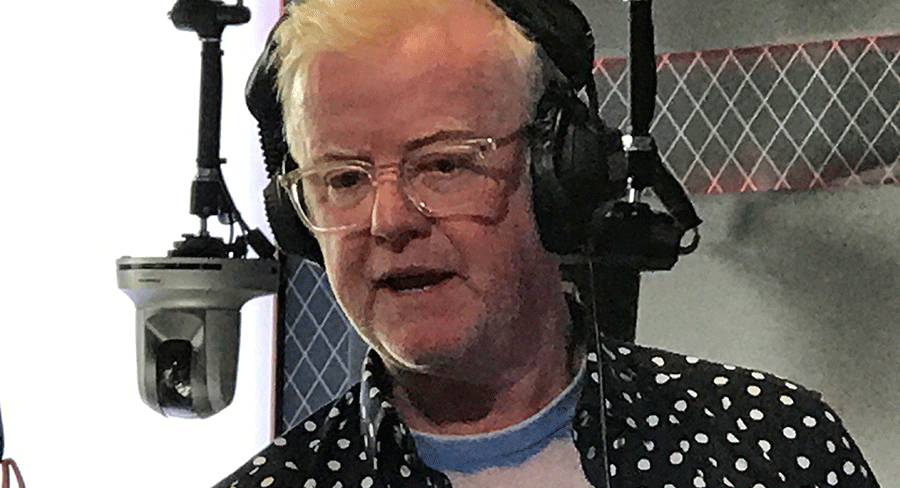
Virgin Radio’s Chris Evans
To make a noise at the station Virgin then targeted the country’s #1 announcer, BBC Radio 2 breakfast host Chris Evans. The Evans bid was successful and he left the BBC just prior to Christmas 2018, taking some of his key on-air talent with him.
Two other things that made a difference at Virgin was a landmark deal with Sky TV, which gives them naming rights. The deal enables Virgin Radio be ad free in breakfast, with editorial content pointing to Sky at different times.
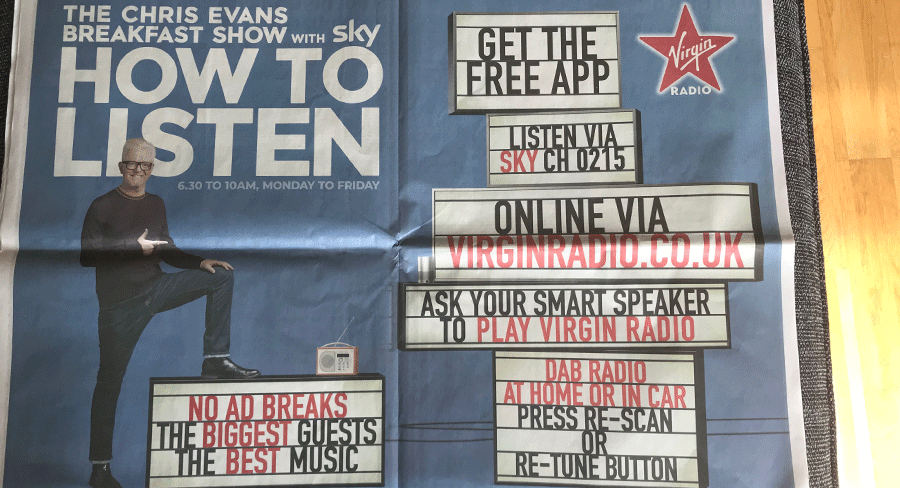
Working for News Corp gives you some marketing muscle – a Virgin Radio spread in the weekend’s Sunday Times
Cass then staffed up the station with a number of Aussies – Nick Daly, Deputy Content Director (former Nova 100 EP, ARN EP & Absolute Radio EP) Jayne Cheeseman, producer (former FBI Sydney) James Grove, Content Manager for Virgin Radio brands Chilled & Virgin Radio Anthems (former Gold 104.3 MD) and Ollie Geale, assistant producer (Nova & EON Sportsradio).
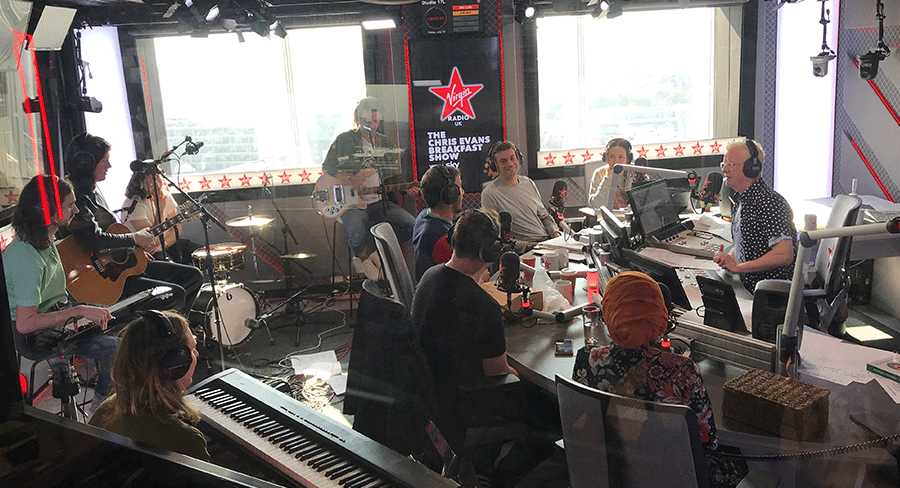
Virgin Radio’s Chris Evans
Host Chris Evans and his team work in spacious state-of-the-art studios high above the Thames in the top of the News Corp London tower.
Just across the river and up a bit is almost the antithesis of what Virgin Radio is doing.
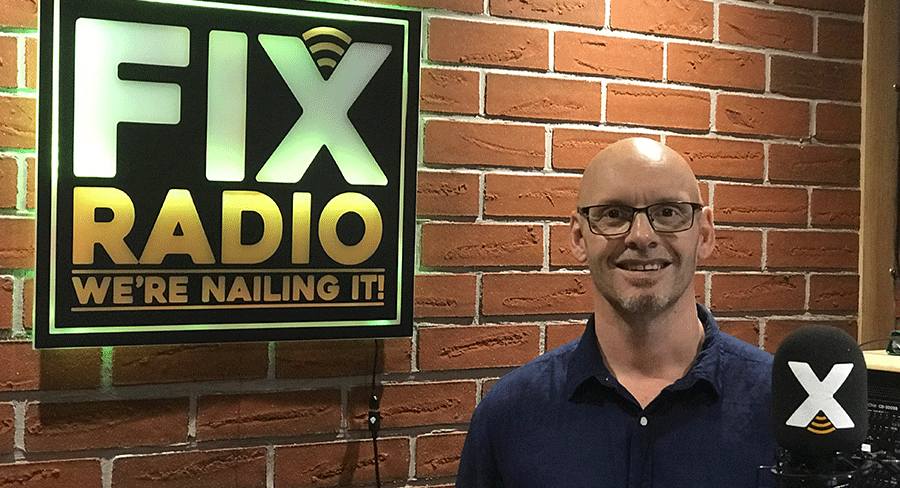
Phil O’Neil at work in London’s smallest radio studio
Fix Radio is a minnow DAB+ station by comparison that targets tradies.
It pushes out a feed to London and Manchester and it too features Aussie radio experience. Recently departed Triple M announcer (Ugly) Phil O’Neil handles the breakfast show and his PD is a Brit with Aussie radio experience – Graham Mack.
Speaking to Mediaweek in what might be London’s smallest, all brick no window, studio, O’Neil said:
“I was keen to get back to the UK and my girlfriend was keen to get back as well. The position at Fix became available and I went for it.”
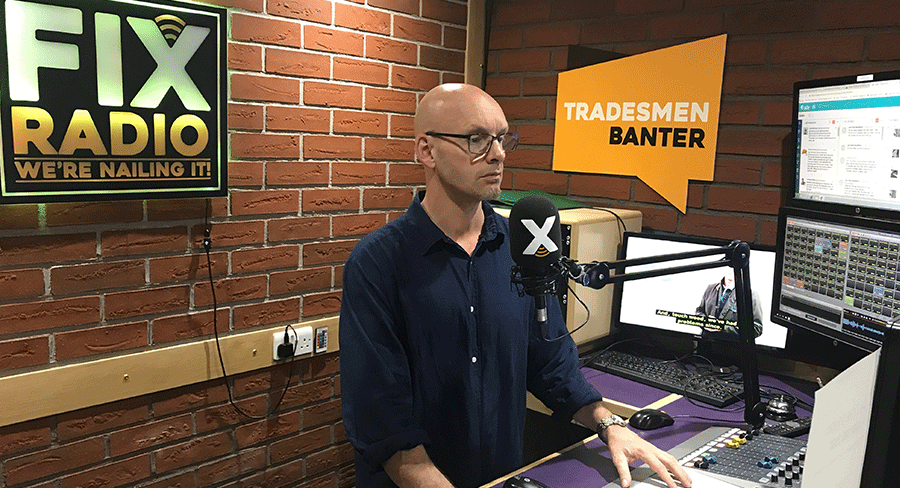
Phil O’Neil at work in London’s smallest radio studio
O’Neil had been doing daytime shifts at Triple M and he didn’t feel there was much scope to do something different. “To be honest I was a bit bored doing 10 second links.”
O’Neil was perhaps at his best in Australian radio when he worked nights. “I enjoyed the freedom to be creative. The limitations in daytime radio don’t allow that. At Fix they asked me what I wanted to do and said to have the freedom to do new and creative things on air.
“It’s a very small station as you can see, and they offered me the chance to come in and do pretty much anything I want within the boundaries of the format.”
Although O’Neil doesn’t choose his breakfast playlist, he has the opportunity to have artists perform on the show plus conduct a range of interviews that can cover everything from politics to lifestyle. “As a middle-aged man now, it gives me the chance to stretch my areas of interest.”
Fix launched just over two years ago aimed at tradespeople and is privately owned by a consortium. People can listen to the station on DAB+, stream on the internet or via the Fix Radio app.
O’Neil’s program director is Graham Mack who has a busy CV, which includes time spent in regional radio in Australia including time at 2GO on the NSW Central Coast.
Mack’s brief to O’Neil gives him a lot of rope. “Be creative and make some noise in the market.”
In the past, O’Neil has not seen eye to eye always with station managements. His career has seen him work on both sides of Australia on a handful of cap city commercial licences, in most timeslots from breakfast to evening.
His most memorable management run-in was perhaps in the early days of Nova 969 where he hosted the highest rating of the new station’s timeslots in drive. But he talked too much!
“I was told to play less music,” he remembered. “The program director wanted me to play 15 songs an hour. I then did two shows where I didn’t talk at all just to see how many songs I could get away. I could only manage 14! I just didn’t enjoy it so I left.”
Phil noted the irony that most major FM drive shows are now full of talk.
His radio journey saw him on everything from the pioneering Hot 30 program on Fox and 2Day where he hosted with his then wife Jackie O. He also worked in Perth at 96FM, Star FM on the Central Coast and spent many years at Triple M in several tours of duty, perhaps most successfully hosting The Rubber Room in evenings.
“I have good and bad memories about all of them,” he laughed. “Every experience is what you make of it and some jobs offered me more freedom than others.”
Did he get disillusioned about radio often? “All the time,” was his quick reply. But not where he is now.
“This is a small station and they are prepared to take risks and there aren’t a lot of risks in radio any more.”
As to people he enjoyed working with and learnt from in Australia, O’Neal mentioned first Jeff Allis. Others he named were Corey Kaye in Brisbane (now on the Gold Coast), and the great Guy Dobson.
For the time being O’Neil is thriving in his new environment. He also notes that age and experience seem to mean a bit more in UK radio. “When you get to a certain age in Australia you become no longer of any use at some stations. In the UK the majority of the broadcasters at big stations in key shifts are in their 40s and 50s. UK radio tends to hire more broadcasters than reality TV contestants.”
—
Top Photo: Virgin Radio’s Chris Evans at the top of the News tower
